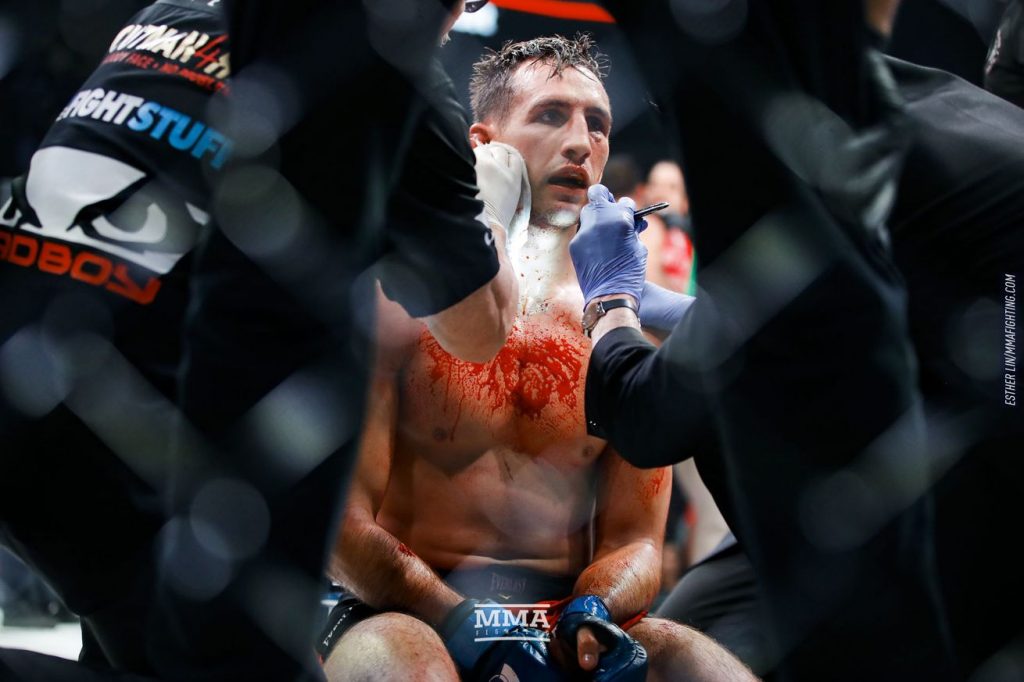
Rory MacDonald’s ambition is to be admired. At the same time the Canadian star committed to competing in a tournament in which he would defend his welterweight championship through every round of his participation, he simultaneously moved up a weight class to fight reigning middleweight champion Gegard Mousasi. In retrospect, the plan was far too audacious, as Mousasi emphatically denied MacDonald’s bid to become Bellator’s first-ever two-division champ with a smashing second-round TKO.
Now MacDonald will return to his own weight class to compete in the tournament with his momentum zapped. To be sure, it wasn’t the kind of life-changing, career-altering war that ensures a career will never be the same. It wasn’t a sustained battle like his legendary July 2015 fight against Robbie Lawler—a beating that took him a year to recover from.
In some ways, it was worse, at least in the sense that MacDonald never quite seemed to threaten Mousasi in any meaningful way. Mousasi had warned that the weight, size and strength differentials would result in a dominant victory for him, and he was emphatically correct. MacDonald’s quest, once noble though it seemed, suddenly felt like a fool’s errand.
The result serves as a good reminder of just how difficult it is to become a simultaneous two-division champ in MMA.
For most of major MMA’s history, the double title had been ignored, yet more recently, it has become the pursuit du jour. The accomplishment, pulled off in the last few years by both Conor McGregor and Daniel Cormier, and nearly a dozen years ago by Dan Henderson before them, requires a certain set of circumstances and skills that are difficult—nearly impossible—to marry.
While the achievements of all three men who pulled off the feat are to be celebrated, I would argue that of the three, McGregor’s conquest was the most unlikely of the three, if only because of the sheer numbers of competitors parading through his divisions—featherweight and lightweight. Looking at the distribution of athletes by division, there are simply more bodies populating those lower weight classes than there are as we edge up toward the higher ones. Currently in the UFC, for example, there are approximately 67 featherweights and 77 lightweights on the roster. Meanwhile, there are only 47 light-heavyweights and 43 heavyweights. To become champ-champ at the lower classes requires wading through more competition.
Then again, there is something to be said for sheer size, and the larger weight classes require you to (potentially) give up more weight. While the gap between McGregor’s original featherweight class and his later lightweight home was only 10 pounds, Cormier faced the prospect of going from a light heavyweight class limit of 205 pounds to heavyweight, where the big men can weigh as much as 265. In that case, however, Cormier out-weighed his opponent Stipe Miocic by 3.5 pounds, making the point moot.
On Saturday night at Bellator 206, MacDonald’s quest came to a halt almost as soon as it began. Facing a fighter who mirrors many of his skills, the difference was length and power. In other words, the things often inherently carried by the bigger man. Mousasi repeatedly pumped out the jab, first using it as a range-finder, then stiffening it into a battering ram. By the end of the first round, MacDonald was already stuck in no man’s land trying to get past it.
Facing that distress, MacDonald tried a new tactic, shooting an ill-advised Imanari roll and ending up on his back after a scramble. Again, this is a position that, all other things equal, intrinsically favors the larger man.
Anyone who has seen Mousasi’s mount knew it was big trouble, and as soon as he got to the position, MacDonald’s two-division title quest was all but over.
This isn’t to criticize MacDonald for having big dreams. That is, after all, what sports are all about. But it does serve as a reminder that in a sport that prizes power and strength, size does matter.
It’s especially worth remembering that as we roll into UFC 229 week and anticipate the fireworks between McGregor and Khabib Nurmagomedov. Of course, McGregor is not officially the “champ champ” anymore, having been stripped of both belts during his two-year sabbatical from the cage. But he still calls himself the moniker, and many fans still feel he deserves to until he loses. During his hiatus, he’s had the opportunity to better acclimate his body to the larger weight class, but make no mistake, he will still be the smaller man in the cage. Should his accuracy not be there, should any conditioning issues appear, McGregor may face a similar fate as MacDonald.
There are lessons to be learned from Mousasi-MacDonald, but mostly we choose to consider them for a moment before wiping them from memory with a quickness. That makes sense, since we want to anticipate these kinds of fun and unconventional matchups rather than dread them. MMA by its nature is a forward-looking sport, and the shiny new objects in the distance often distract us from the danger in pursuing them. MacDonald took his shot, but becoming champ-champ ain’t no easy thing.





More News
Quiñonero fights Verdadero in Resbak 2
Resbak 2 at Malungon, Sarangani Province on July 12
Garde stops Baliente in 1st round in “Resbak”